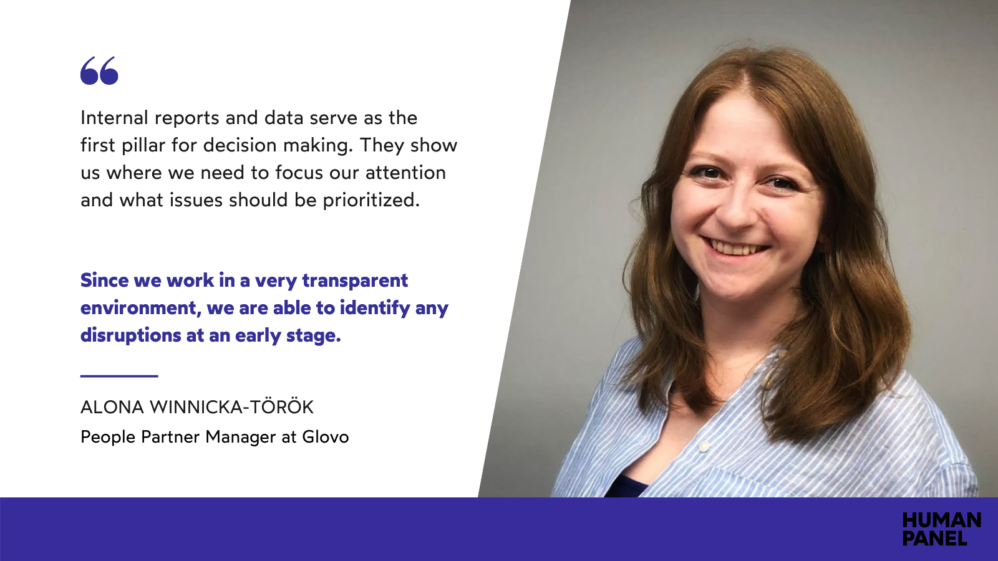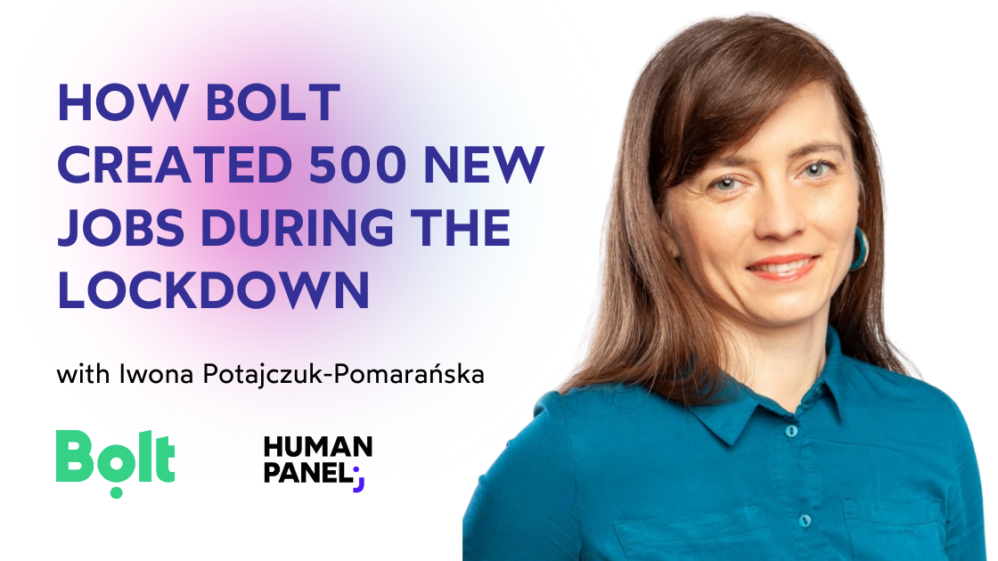5 exclusive HR insights from Glovo’s People Partner Manager, Alona Winnicka –Török

Would you like to get a peek into Glovo’s recruitment strategy and career policies? We speak to Alona Winnicka –Török, People Partner Manager at Glovo, who shares with us some insights into the company’s HR processes.
Alona Winnicka–Török is People Partner Manager at Glovo, a Barcelona–based startup and the fastest growing delivery service provider in Europe, Western Asia and Africa. Last spring, Glovo picked up a Series F of €450m, the largest funding round ever raised by a Spanish startup.
Currently, Glovo employs a team of 3,000 people worldwide and is expanding rapidly. The company is already present in 21 countries. One of the Glovo Tech Hubs is based in Warsaw, Poland, and employs a team of 50+, with plans to double that number in the foreseeable future.
The company’s vision is not only to give everyone easy access to anything in their city, but also to offer employees the job of a lifetime.
Alona Winnicka–Török is responsible for the entire employee cycle in the Polish market. She leads a recruitment team, cooperates with other markets, and supports managers in their decision–making process.
Alona shared with Human Panel 5 exclusive insights about her role at Glovo and the company’s policies and HR processes. Are you curious to read them? Let’s go then!
Recruitment
Our recruitment is structured around the Glovo values, which are:
- Gas: We work with energy, innovation, and passion for what we do. We are committed.
- Care: We act in the best interest of a sustainable future.
- Good vibes: We always see the positive side in every situation and act with fairness and honesty with everyone, regardless of gender, sexual orientation, religion and abilities.
- Stay Humble: We embrace mistakes and feedback to learn from them.
- Glownership: We roll up our sleeves and get work done, regardless of our position and level.
For every candidate in the hiring process, we use scorecards to see if a person fits into our culture.
We often visit the key stages of the recruitment process in pairs. For example, a Recruiter with a Hiring Manager or a People Partner with a General Manager – to support each other and understand each other’s needs better.
The recruitment process is highly standardized, although it can vary depending on the seniority of the position. For key senior positions, we use competency testing and extended business cases. For entry-level positions or internal recruiting, we shorten the process to make it more efficient.
At Glovo, we support internal promotions, and we often look for talent within the company. Last year, we carried out 30 promotions in Poland. However, considering our size and dynamic growth, we also hire external candidates on a large scale.
Alona Winnicka –Török
Career Development
We have career development plan templates where an employee can indicate their goals and possible future roles and responsibilities.
For learning and training we use the 70–20–10 model which assumes that 70% of learning comes from experience, 20% from working with others and 10% from formal interventions and planned learning solutions.
I also hold regular meetings with managers, where we discuss and debate any current issues.In my opinion, conversations are an invaluable source of information and insightand I always try to be guided by what is going on in the organization.

Every 45 days, we conduct an employee evaluation by managers. We evaluate our employees on two axes: the results axis and the values axis. This helps us identify top talent early and be proactive about career development and possible promotions. On the other hand, we can react and create an improvement plan if someone experiences problems reaching the goals or does work in line with our values.
Every six months, we conduct a general assessment of our employees’ and managers’ performance and review the calibration. The calibration helps us teach managers how to apply the Glovo standards better when assessing their direct reports’ performance on the job. We also teach them how to assess whether members of their teams align with our values.
Engagement
We conduct complex internal engagement surveys every six months. We have many internal initiatives and surveys about how our employees rate the different areas of the business.
I see a big challenge in this field, as remote working requires stronger actions from HR leaders to maintain company culture and employee engagement. It’s a new and exciting area – how to engage employees and make them feel part of the team in a hybrid work environment.
Inclusion
Inclusion is vital to us, and our OKRs cover it extensively. We welcome diversity and cultivate an inclusive environment, where everyone feels empowered. One such example is how we pay attention to gender balance, especially in tech teams. Our Diversity & Inclusion Team has its own goals to make our workplace even more friendly, diverse, and inclusive.
We also train our teams heavily internally on inclusion and are constantly looking for new ways to support the LGBTQ+ community as well as ethnic diversification. There is also an employee resource group called Uniqorns that focuses on making everyone in the LGBTIQ+ community feel welcome, safe, authentic and valued at Glovo, as well as strengthening inclusion by raising awareness globally.
We post our job openings on myGwork, a business community for LGBT professionals, students and inclusive employers. All of our job postings include a line asking the candidate to feel free to note which pronouns they use (she/her, he/she, they/them).
On top of that, we have an internal Specialized Treatment Policy where we cover treatments not covered by insurance like gender reassignment surgery.
Transparency of data
Internal reports and data serve as the first pillar for decision making. They show us where we need to focus our attention and what to prioritize. Data also helps us identify issues and address them. Because we work in a very transparent environment, we can identify any disruptions early.
Data support helps us make quick and informed decisions. For example, thanks to benchmarking and feedback from our candidates, we were able to make adjustments to our recruitment processes and find a satisfactory solution to the problem that arose.
I personally believe that the human factor is essential – if we work with the wrong data, the analysis will be flawed. No matter what tools and systems we use then – in the end, we always need people.
If you want to work with the right data and the right tool that will make your workforce management easier, check out our free demo and see how Human Panel can improve your recruitment process, plan career paths and increase diversity. Contact us by filling in the short form below.




